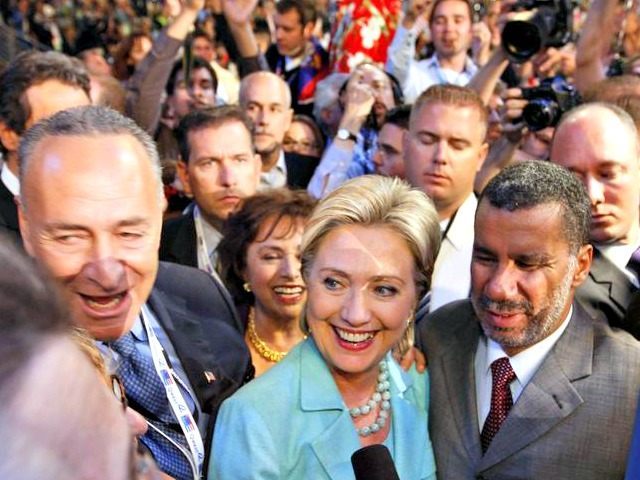On Saturday, Bernie Sanders swept Democrat caucuses in Washington, Alaska, and Hawaii. The scale of his victories in each state is a story in itself. He won 70 percent of the vote in Washington and Hawaii and a staggering 80 percent in Alaska. The victories underscore how close the race for the Democrat nomination actually is.
Currently, Hillary Clinton has just over 1,700 delegates in her quest for the Democrat nomination, while Bernie Sanders has just over 1,000. He will likely pick up additional delegates after Saturday’s final results are tabulated, but, on the surface, he still looks to be trailing Clinton by a wide margin.
Much of Clinton’s margin over Sanders, however, is built on support from “superdelegates,” a class of delegates unique to the Democrat party. Superdelegates aren’t bound to any candidate until they cast their vote at the Democrat National Convention. Legally, they can switch their support at any time.
Setting aside the pledges of the superdelegates, the margin between Clinton and Sanders is much more narrow. Clinton has just over 1,200 delegates awarded through primary and caucus voting, while Sanders has over 1,000. There are still around 2,000 delegates available through the remaining primaries.
One of the more disengenuous actions of the media in this primary season has been to count “superdelegates” in Clinton’s tally of delegates. The media didn’t do this in 2008, when she also had a huge lead in the number of superdelegates who were pledged to her before the DNC convention.
In 2008, the media mentioned her overwhelming support from superdelegates, but it was treated as almost a seperate primary and wasn’t included in her overall delegate count. This made sense, because their votes weren’t bound to any candidate until the convention. Indeed, the primary really turned in Obama’s favor after many of these superdelegates announced publicly they were switching their support or moving to neutral.
If the superdelegates immediately announced they were neutral and would honor the wishes of primary voters, the race between Clinton and Sanders would be a toss-up, with Clinton having only a slight edge. If they switched their support to Sanders, he would be ahead of Clinton.
If Clinton has a “lock” on the Democrat nomination, it is only because of the support of superdelegates.
A few words about “superdelegates.”
Superdelegates are a unique feature of the Democrat nominating process. Making up about 15 percent of the total number of delegates, they have individual votes for the nominee based on their elected office. The include Democrat Members of Congress, Governors, members of the Democrat National Committee, and other “leaders” of the party. They cast individual votes, not tied to primary results in their state or congressional district.
On one hand, its ironic that a democratic party would put so much power over its nominee in the hands of a relatively small number of party apparatchniks. The votes of these superdelegates counter the votes of millions of Democrat party primary and caucus voters.
On the other hand, of course, it is completely fitting that Democrats would entrust such power to the hands of a few loyal party members. The intellectual foundation of the modern Democrat party, after all, is trade unionism, where individual workers have more power based on their tenure of position.
Regardless of its justifications, the superdelegate system gives the national Democrat party enormous control over its nominating process. While the system gives Hillary Clinton a prohibitive edge in the race for the nomination, it also obscures how incredibly weak she is as the party’s candidate.
In many ways, Hillary is a regional candidate, dominating in the Southern states while either losing or just edging Sanders everywhere else. She is also dependent on the overwhelming support of African-American voters. In some states, even, Hillary has won a larger share of the African-American vote than President Obama did eight years ago.
That isn’t necessarily good news for Hillary heading into November. Her overwhelming margins with African-American voters has been due, in part, to the fact that far fewer of them are voting this year compared to primaries eight years ago.
Mathematically, Hillary needs African-Americans to vote in roughly the same numbers they did in 2008 and 2012 to have any chance of winning the White House. The drop-off in their votes in the primary are not a good sign for Democrat chances in November.
The real flaw in the superdelegate system, however, is that it allows the nomination of a candidate without the strong backing of the Democrat electorate. A great deal has been written about the dramatic drop-off in Democrat primary voting this year, compared to the Republican primaries, or even the Democrat contest eight years ago.
The true story of the drop in turnout, however, is even more troubling for Clinton. The drop-off has been most pronounced in states where she beat Sanders in a landslide. In states that were closely contested, or in states that Sanders won, the Democrat turnout has been relatively high.
Hillary Clinton will likely win the Democrat nomination, but her victory will be based on a sense of duty rather than enthusiasm for her. Her nomination is being sealed with the votes of party officials, rather than the party’s voters. It is a time-honored formula to win the nomination. It rarely works in the general, however.

COMMENTS
Please let us know if you're having issues with commenting.